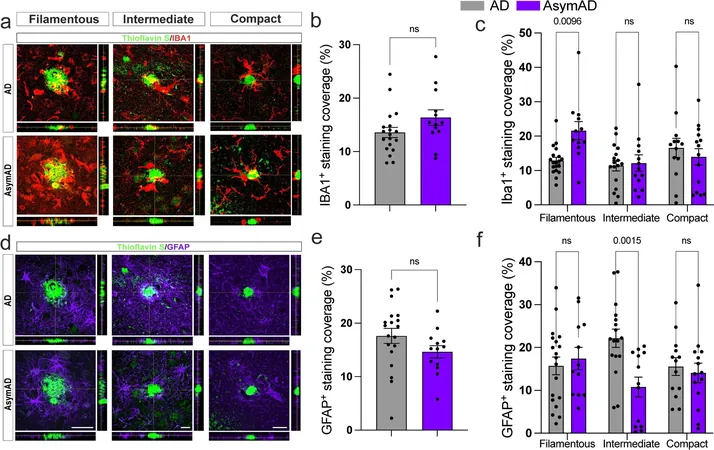
Unveiling the Protective Secrets of Asymptomatic Alzheimer's: A Groundbreaking Study
2024-10-03
Author: Rajesh
Introduction
Researchers from Indiana University School of Medicine have made significant strides in understanding the brains of individuals with asymptomatic Alzheimer's disease. Despite the presence of harmful amyloid plaques and tau tangles—hallmarks of Alzheimer's—these individuals exhibit no diagnosable dementia symptoms during their lifetime. The study reveals vital mechanisms that could potentially protect against cognitive decline associated with Alzheimer's disease.
Research Background
The groundbreaking research was conducted by a dedicated team at the Stark Neurosciences Research Institute, led by Dr. Nur Jury-Garfe and Dr. Cristian Lasagna-Reeves. Their findings, published in the prestigious journal Acta Neuropathologica, introduce a new perspective on Alzheimer's disease pathology by focusing on resilience rather than just deterioration.
Understanding Alzheimer's Disease
Alzheimer's is characterized by the accumulation of beta-amyloid plaques and tau tangles, which can severely disrupt normal brain function, resulting in memory loss, cognitive decline, and personality changes. However, in asymptomatic individuals, researchers found an intriguing phenomenon—an abundance of microglia, the brain's immune cells, surrounding these amyloid plaques. These microglia showed enhanced mobility thanks to specific actin-based motility proteins, functioning as the brain's first line of defense by 'cleaning up' toxic materials and damaged neurons.
Role of Microglia
Dr. Jury-Garfe likened the motility proteins to 'tiny engines' that enable microglia to efficiently respond to and manage the damage caused by harmful proteins. In the early stages of Alzheimer's, when these proteins are functioning optimally, they help microglia reach and surround toxic plaques swiftly. This could be crucial in preventing further brain damage—a bit like having a highly efficient cleaning crew that maintains order before problems escalate.
Unexpected Discoveries
Furthermore, the team made an unexpected discovery: the tau seed capability, responsible for propagating tau proteins throughout the brain, was significantly diminished in the brains of asymptomatic Alzheimer’s patients. This finding presents new avenues for research, suggesting potential protective factors that could help stave off the neurodegeneration typical of symptomatic Alzheimer’s.
Conclusion
In conclusion, this study not only highlights the unique resilience observed in the brains of asymptomatic Alzheimer's patients but also opens up exciting possibilities for developing strategies aimed at enhancing these protective mechanisms. Understanding and harnessing these natural defenses against Alzheimer’s could revolutionize approaches to treatment and prevention, potentially transforming the future of cognitive health. Stay tuned as the implications of this research unfold!






 Brasil (PT)
Brasil (PT)
 Canada (EN)
Canada (EN)
 Chile (ES)
Chile (ES)
 España (ES)
España (ES)
 France (FR)
France (FR)
 Hong Kong (EN)
Hong Kong (EN)
 Italia (IT)
Italia (IT)
 日本 (JA)
日本 (JA)
 Magyarország (HU)
Magyarország (HU)
 Norge (NO)
Norge (NO)
 Polska (PL)
Polska (PL)
 Schweiz (DE)
Schweiz (DE)
 Singapore (EN)
Singapore (EN)
 Sverige (SV)
Sverige (SV)
 Suomi (FI)
Suomi (FI)
 Türkiye (TR)
Türkiye (TR)